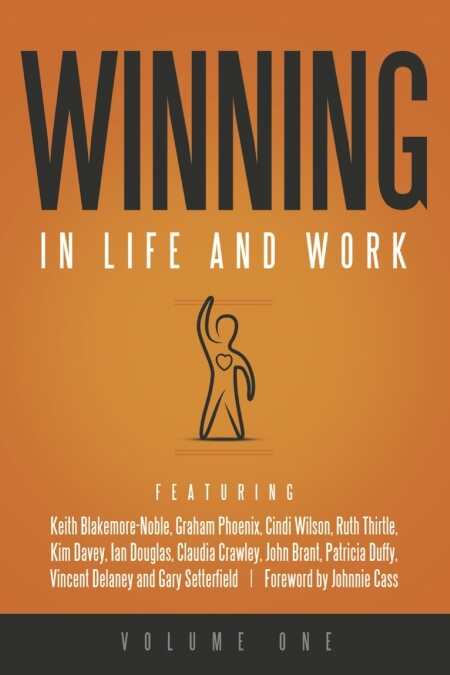Winning in Life and Work
Vol 1
Look at the author photos on the covers of the latest self-help bestsellers. With their sparkling smiles, the writers are usually pictures of polished perfection. Their confidence is inspiring but may seem beyond the reach of mere mortals. Not so for Keith Blakemore-Noble, who sports eyeglasses and a gap-toothed grin in the picture he chose for his collection of self-help essays, Winning in Life and Work, Volume 1.
Blakemore-Noble is an approachable writer who humbly shares, along with some of the coping tools he has developed, his own struggles with crippling shyness. Anyone who has been stymied by small talk or frozen at the podium will likely sympathize with a man who fled from a cocktail party in terror. If he can overcome his shyness, surely others can too.
The author’s own story is only one of a dozen told in this wide-ranging collection, however, and not all of the contributors are as down-to-earth as Blakemore-Noble. Most of the writers have a book, blog, video, or seminar to sell, and they are all first-rate self-promoters. These are people who grew up watching Anthony Robbins, reading Stephen Covey, and following Rhonda Byrne. Most became motivational speakers or life coaches themselves. Expect a lot of basic advice linked to positive thinking: “Be confident,” and “Ask for what you want,” for instance.
As compiler and editor, Blakemore-Noble has chosen a diverse range of experts to address topics from increasing intimacy and coping with chronic illness to acing job interviews. For instance, the creator of the Good Men Project, Graham Phoenix, pens a provocative chapter on the roles of men and women in sex, which is followed by an ode to gratefulness by globally known business-transformation consultant Cindi Wilson.
Some of the strongest entries cover an unexpected topic or explore a topic in an unexpected way. The carefully considered thoughts from Ian Douglas on coping with the aftermath of grief are especially refreshing in contrast to the unfailingly upbeat tone of many of the other pieces. Instead of glossing over negative emotions, Douglas uses his own grief experiences to show how these uncomfortable emotions can be successfully faced and conquered.
In both his opening essay and his closing remarks, Blakemore-Noble encourages readers to see his book as an ongoing conversation rather than an instruction manual. He suggests reading and rereading the sections that seem most compelling, based on a reader’s own issues. While reading more than two hundred pages loaded with exclamation points can be fairly overwhelming, the cheerleading tone of the book can be inspiring in small doses.
The pep talks in Winning in Life and Work may be best read a chapter at a time in the context of a reader’s current needs. In addition to future volumes of essays, interested readers can also look for Blakemore-Noble’s forthcoming Ultimate Confidence.
Reviewed by
Sheila M. Trask
Disclosure: This article is not an endorsement, but a review. The publisher of this book provided free copies of the book and paid a small fee to have their book reviewed by a professional reviewer. Foreword Reviews and Clarion Reviews make no guarantee that the publisher will receive a positive review. Foreword Magazine, Inc. is disclosing this in accordance with the Federal Trade Commission’s 16 CFR, Part 255.

